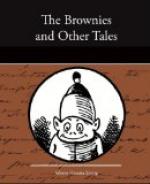“I don’t care for magpies,” said Amelia; “I threw a stone at that one to-day.”
And she left the nursery, and swung down-stairs on the rail of the banisters. But she did not go into the drawing-room; she opened the front door and went out into the moonshine.
It was a lovely night. But there was something strange about it. Everything looked asleep, and yet seemed not only awake but watching. There was not a sound, and yet the air seemed full of half-sounds. The child was quite alone, and yet at every step she fancied some one behind her, on one side of her, somewhere, and found it only a rustling leaf or a passing shadow. She was soon in the hayfield, where it was just the same; so that when she fancied that something green was moving near the first haycock she thought very little of it, till, coming closer, she plainly perceived by the moonlight a tiny man dressed in green, with a tall, pointed hat, and very, very long tips to his shoes, tying his shoestring with his foot on a stubble stalk. He had the most wizened of faces, and when he got angry with his shoe, he pulled so wry a grimace that it was quite laughable. At last he stood up, stepping carefully over the stubble, went up to the first haycock, and drawing out a hollow grass stalk blew upon it till his cheeks were puffed like footballs. And yet there was no sound, only a half-sound, as of a horn blown in the far distance, or in a dream. Presently the point of a tall hat, and finally just such another little wizened face, poked out through the side of the haycock.
“Can we hold revel here to-night?” asked the little green man.
“That indeed you cannot,” answered the other; “we have hardly room to turn round as it is, with all Amelia’s dirty frocks.”
“Ah, bah!” said the dwarf; and he walked on to the next haycock, Amelia cautiously following.
Here he blew again, and a head was put out as before; on which he said,
“Can we hold revel here to-night?”
“How is it possible,” was the reply, “when there is not a place where one can so much as set down an acorn cup, for Amelia’s broken victuals?”
“Fie! fie!” said the dwarf, and went on to the third, where all happened as before; and he asked the old question,
“Can we hold revel here to-night?”
“Can you dance on glass and crockery sherds?” inquired the other. “Amelia’s broken gimcracks are everywhere.”
“Pshaw!” snorted the dwarf, frowning terribly; and when he came to the fourth haycock he blew such an angry blast that the grass stalk split into seven pieces. But he met with no better success than before. Only the point of a hat came through the hay, and a feeble voice piped in tones of depression—“The broken threads would entangle our feet. It’s all Amelia’s fault. If we could only get hold of her!”
“If she’s wise, she’ll keep as far from these haycocks as she can,” snarled the dwarf, angrily; and he shook his fist as much as to say, “If she did come, I should not receive her very pleasantly.”




